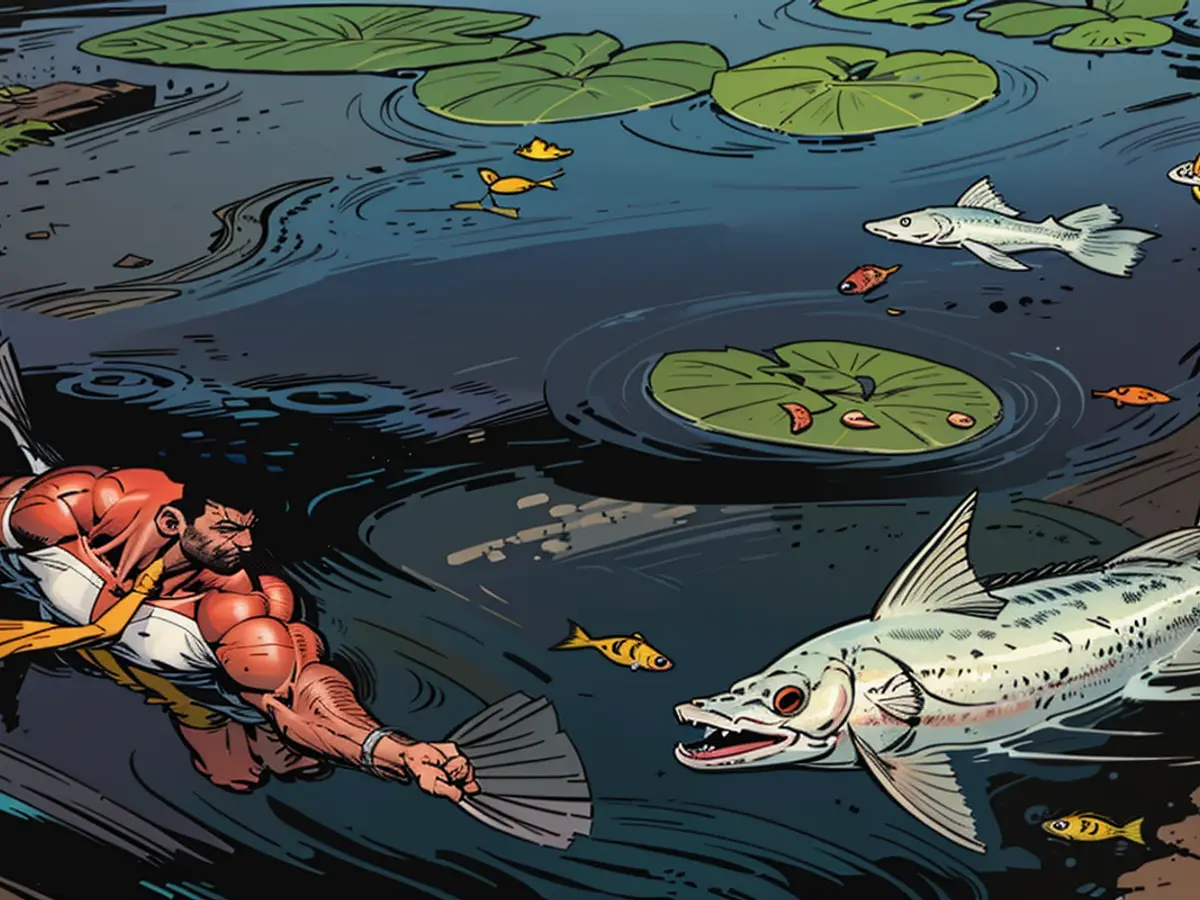Ecological contamination - Worries over fish in the Oder river due to rising levels of golden algae
The Oder river, a prominent boundary between Germany and Poland, currently faces escalating concerns as dead fish and excessive growth of toxic golden algae surface. After recent consultations, the Environment Ministry in Potsdam conveyed no comfort, as the river's situation remains worrying.
Reminiscent of the tragic fish die-offs in 2022, this golden algae boom is likely linked to the poison it brings. Scientific and environmental communities fret over the river's state. Greenpeace and WWF have slammed the mining industry's inappropriate salt contributions as the culprit.
Measurements persist with drastically high readings
Authorities reported a minor improvement compared to the past weekend but admit to the continuing sky-high measurements pertaining to electrical conductivity and chlorophyll content in the water. These measurements often indicate salinity and marine life pollution. Frankfurt’s Oder also exhibited substantial levels of toxicity. On Tuesday, reports of a horde of deceased fish along the banks were noted.
"Hazard Level 3 is still in place," the Environment Department mentioned. This highest threat calculates a probable outbreak of the contaminating algae, Prymnesium parvum. The impending menace in 2022 had been catalyzed by high salt levels, dilapidated water levels, intense heat, and Prymnesium parvum's poison.
State Environment Agency works with management protocols and communications
The agency revealed the intention to execute further strategies for water management while updating various stakeholders, including the Federal Environment Ministry. The department expressed slight relief, as the current weather benefits the Oder, simulating conditions unequal to those of the 2022 catastrophe. Yet, the agency warned of the persisting risks from the infamous golden algae and high salinity.
Golden algae expert Christian Wolter voices alarm
Fish ecologist Wolter, based at the prestigious Leibniz Institute for Freshwater Ecology and Inland Fisheries (IGB), is apprehensive. Wolter declared, "We're concerned about the rapid advancement of golden algae (Prymnesium parvum) but cannot tell precisely how this growth is progressing. Analyses will provide fresh knowledge on the pond’s situation." The IGB staff diligently monitors the Oder, focusing on alga abundance. The fish ecologist claimed that the carcasses uncovered have predominantly been spotted in tributaries off the main Oder; the main river has been spared for now.
Annual forewarnings indicate continued threats
Inevitably, the potential for an Oder environmental disaster was already predicted in recent times. Environmentalists insist that more thorough protections are required for this delicate, shared river. Last summer, it was reported that the risk of a catastrophe had been averted. Now, Greenpeace urges action against the continued salt contributions.
Greenpeace's Toxin Expert Condemns Inaction on Salt Introductions
Greenpeace has halted salt discharge from Polish mines, accusing the government of paralysis since the 2022 fish deaths. The organization decried: "The consequences are glaring and directly measurable - the salt and chlorophyll levels in the Oder have steadily increased in the past weeks and months."
Exclusively when authorities arrest these salt introductions and implement appropriate supervision will the impending ecological catastrophes in the Polish-German river be avoided, said the Environmental Toxicologist from Greenpeace, Julios Kontchou. The European Commission's report illustrates that the salty, polluted Oder "may have, at least partially, been attributed to the outpouring of highly salty industrial waste, specifically from mining activities."
Polish authorities optimistic about Halting Golden Algae in Gleiwitzer Canal, but warnings linger
Poland’s Environment Ministry announced a swelling of golden algae and affirmed ongoing monitoring. However, the Gleiwitzer Canal branching off the Oder has experienced a steep drop in alga density. Polish authorities are attempting to increase water flow, with plans of disruption of more golden algae proliferation, as reported in May.
Read also:
- The Environmental Protection Agency in Brandenburg, aware of the concerns in Frankfurt (Oder), is actively collaborating with experts to mitigate the environmental pollution caused by the golden algae.
- The WWF and Greenpeace, in response to the rising salinity and chlorophyll levels in the Oder, have urged the German Federal Ministry for the Environment, Nature Conservation and Nuclear Safety (BMU) to take immediate action against salt introductions.
- Christian Wolter, a renowned golden alga expert based in Potsdam, is closely monitoring the situation in the Oder, hoping to gain insights into the current propagation and potential impacts on local animal populations.
- Despite the minor improvement in water quality over the weekend, various environmental groups remain concerned about the long-term consequences of the golden alga outbreak on both the river's ecosystem and the health of the fish population in Frankfurt (Oder).
- The rise in golden algae in Frankfurt (Oder) has led to a series of debates within the regional government, with key figures advocating for increased investment in water treatment facilities and salt filtration systems to protect the environment and preserve the river's natural balance.
- Authorities in Potsdam have partnered with local fisheries and conservation groups to develop a contingency plan for managing future golden algae episodes and minimizing the impact on the ecosystem, as well as ensuring the safety of animals and aquatic life in the affected areas.
- During a speech at a recent environmental conference in Berlin, BMU's Secretary of State, Jochen Flasbarth, emphasized the urgent need for international cooperation in tackling emerging threats such as the golden alga bloom, with the potential for cross-border impacts and the need to address shared concerns.
- The environmental disaster in Frankfurt (Oder) serves as a stark reminder of the importance of proactive environmental management and sustainable water resource management, as well as the necessity for collaborative action between different stakeholders to protect the health of both wildlife and human populations in riverine ecosystems.








